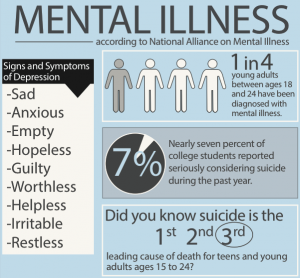College is already a high-stress environment, when trying to balance academics, a social life and work-related experiences all at once. Adding semester finals and the holiday season into the mix can irritate anxiety levels even more.
However, the weight of anxiety, stress and other personal issues can exist outside of finals and the holidays.
According to the most recent report published by the American College Health Association, nearly 30 percent of college students reported levels of depression in the last year that were so high it made it difficult for them to function.
In the same report, nearly seven percent of college students reported seriously considering suicide, and one percent of students attempted suicide.
As the third leading cause of death for people between 15 and 24, suicide accounts for 13 percent of deaths each year.
Bradley administration, faculty and staff are encouraging students to utilize available resources and focus on personal well-being, noting that personal health is of the greatest importance.
“With the stress of projects, papers and finals, it is important we take care of ourselves physically, mentally and emotionally,” Vice President for Student Affairs Nathan Thomas said. “As you study, some of the best things you can do to take care of yourself involve getting proper sleep, eating a balanced diet and getting physical exercise.”
According to Interim Director of Wellness Lyndsey Hawkins, there is a variety of stress contributors.
“During college, students undergo a lot of major life changes, which can trigger mental health issues,” Hawkins said. “Often students are not getting enough sleep, not eating healthy, and some are abusing substances, all of which can complicate their situation.”
The National Alliance on Mental Illness (NAMI) found college students, especially between the ages of 18 and 24, reported having higher than average levels of stress, many of which have the potential to lead to more serious mental illnesses.
In the 2012 issue overview, NAMI also reported 75 percent of lifetime cases of mental health conditions beginning by age 24. The stigma of having a mental illness was one of the main reasons students reported not seeking help.
Director of Counseling Deborah Montgomery-Coon said students on Bradley’s campus have nothing to be afraid of when it comes to meeting with the counselors or psychiatrist.
“All information students share here is confidential,” she said. “We cannot share anything with parents or friends unless given permission to do so. Unless they are at risk of hurting themselves or someone else, everything is 100 percent confidential. In those cases, we’d only want to make sure everyone is safe.”
Bradley’s Counseling Services has seen an increase in scheduled appointments this year, which resulted in a three-week waiting period for available spots earlier in the semester. However, both University President Joanne Glasser and Thomas told students they were addressing the issue immediately.
Montgomery-Coon said the increase in students seeking assistance is encouraging.
“I think it’s a positive thing that students feel comfortable coming for help,” she said. “Anything we can do to reduce the stigma around receiving mental help is a good thing. It can only benefit the students and the university in the long run.”
Thomas echoed Montgomery-Coon’s positive outlook and said students should always seek out a support system.
“When students reach out to others, whether that be friends and/or counselors, it is always a positive and an opportunity to engage in real, meaningful conversations,” Thomas said. “With all of the stressors and sources of anxiety, we need to find those positive outlets in our lives.”
Hawkins praised Counseling Services for their work and for students having the courage to ask for help.
“Our Counseling Center is phenomenal and can definitely help students who are struggling or even just answer some questions,” she said. “My advice to all students is to reach out. Find a support system. Take care of yourself.”
Between the five licensed professionals and the board certified psychiatrist on staff, Montgomery-Coon said services are available to students at all times.
“We are on-call for you 24-7, all year round,” she said. “There is always someone.”
Montgomery-Coon also said to students seeking help that there are many resources available to students suffering from or having questions about mental illness.
“Our website is equipped to point students in the right direction, and our staff is always on-call,” she said. “There are lots of resources out there for students to use to their advantage.”
Montgomery-Coon cited the Jed Foundation, specifically the site HalfOfUs.com, as sources that not only share important information and resources but help students realize they are not alone in their struggle.
Hawkins said those struggling can reach out to the people around them.
“If a student is struggling, I would just encourage them to go to anyone they know will be supportive and helpful,” she said. “For many students, their parents are a great resource. For others, they might choose to talk to their resident advisor, a faculty or staff member, a friend, a boss.”
Montgomery-Coon echoed Thomas’ and Hawkins’ call to secure the support of others.
“I would strongly recommend students seek out who they trust,” she said. “Having a positive support system is key to helping themselves.”
For more information, students can visit Counseling Services’ page on Bradley’s website or call Counseling Services at (309) 677-2700.









